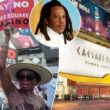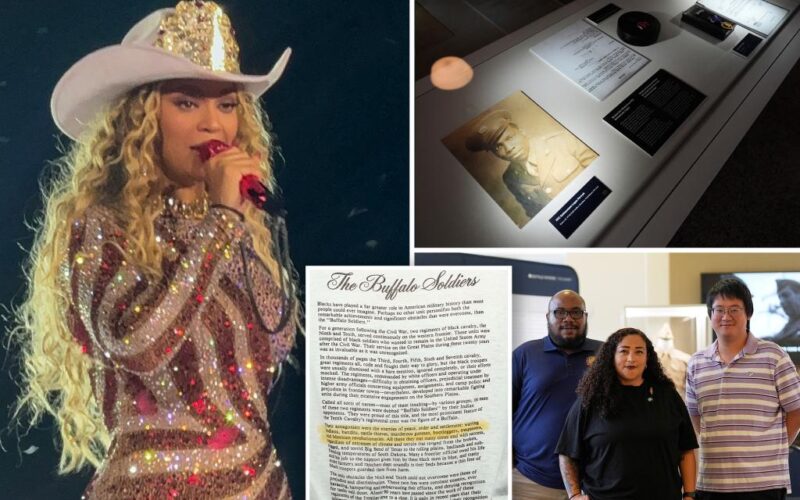A T-shirt worn by Beyoncé during a Juneteenth performance on her “Cowboy Carter” tour has sparked a discussion over how Americans frame their history and caused a wave of criticism for the Houston-born superstar.
The T-shirt worn during a concert in Paris featured images of the Buffalo Soldiers, who belonged to Black U.S. Army units active during the late 1800s and early 1900s. On the back was a lengthy description of the soldiers that included “their antagonists were the enemies of peace, order and settlement: warring Indians, bandits, cattle thieves, murderous gunmen, bootleggers, trespassers, and Mexican revolutionaries.”
Images of the shirt and videos of the performance are also featured on Beyoncé’s website.
As she prepares to return to the U.S. for performances in her hometown this weekend, fans and Indigenous influencers took to social media to criticize Beyoncé for wearing a shirt that frames Native Americans and Mexican revolutionaries as anything but the victims of American imperialism and for promoting anti-Indigenous language.
A spokesperson for Beyoncé did not respond to a request for comment.
Who were the Buffalo Soldiers?
The Buffalo Soldiers served in six military units created after the Civil War in 1866. They were comprised of formerly enslaved men, freemen, and Black Civil War soldiers and fought in hundreds of conflicts — including in the Spanish-American War, World War I, and World War II — until they were disbanded in 1951.
As the quote on Beyoncé’s shirt notes, they also fought numerous battles against Indigenous peoples as part of the U.S. Army’s campaign of violence and land theft during the country’s westward expansion.
Some historians say the moniker “Buffalo Soldiers” was bestowed by the tribes who admired the bravery and tenacity of the fighters, but that might be more legend than fact. “At the end of the day, we really don’t have that kind of information,” said Cale Carter, director of exhibitions at the Buffalo Soldiers National Museum in Houston.
Carter and other museum staff said that, only in the past few years, the museum made broader efforts to include more of the complexities of the battles the Buffalo Soldiers fought against Native Americans and Mexican revolutionaries and the role they played in the subjugation of Indigenous peoples. They, much like many other museums across the country, are hoping to add more nuance to the framing of American history and be more respectful of the ways they have caused harm to Indigenous communities.
“We romanticize the Western frontier,” he said. “The early stories that talked about the Buffalo Soldiers were impacted by a lot of those factors. So you really didn’t see a changing in that narrative until recently.”
There has often been a lack of diverse voices discussing how the history of the Buffalo Soldiers is framed, said Michelle Tovar, the museum’s director of education.
The current political climate has put enormous pressure on schools, including those in Texas, to avoid honest discussions about American history, she said.
“Right now, in this area, we are getting pushback from a lot of school districts in which we can’t go and teach this history,” Tovar said. “We are a museum where we can at least be a hub, where we can invite the community regardless of what districts say, invite them to learn it, and do what we can do the outreach to continue to teach honest history.”
Historians scrutinize reclamation motive
Beyoncé’s recent album “Act II: Cowboy Carter” has played on a kind of American iconography, which many see as her way of subverting the country music genre’s adjacency to whiteness and reclaiming the cowboy aesthetic for Black Americans.
Last year, she became the first Black woman ever to top Billboard’s country music chart, and “Cowboy Carter” won her the top prize at the 2025 Grammy Awards, album of the year.
“The Buffalo Soldiers play this major role in the Black ownership of the American West,” said Tad Stoermer, a historian and professor at Johns Hopkins University. “In my view, (Beyoncé is) well aware of the role that these images play. This is the ‘Cowboy Carter’ tour for crying out loud. The entire tour, the entire album, the entire piece is situated in this layered narrative.”
But Stoermer also points out that the Buffalo Soldiers have been framed in the American story in a way that also plays into the myths of American nationalism.
As Beyoncé’s use of Buffalo Soldiers imagery implies, Black Americans also use their story to claim agency over their role in the creation of the country, said Alaina E. Roberts, a historian, author and professor at the University of Pittsburgh who studies the intersection of Black and Native American life from the Civil War to present day.
“That’s the category in which she thought maybe she was coming into this conversation, but the Buffalo Soldiers are even a step above that because they were literally involved in not just the settlement of the West but of genocide in a sense,” she said.
Online backlash builds ahead of Houston shows
Several Native influencers, performers, and academics took to social media this week to criticize Beyoncé or decry the shirt’s language as anti-Indigenous. “Do you think Beyoncé will apologize (or acknowledge) the shirt?” indigenous.tv, an Indigenous news and culture Instagram account with more than 130,000 followers, asked in a post Thursday.
Many of her critics, as well as fans, agree. A flood of social media posts called out the pop star for the historic framing on the shirt.
“The Buffalo Soldiers are an interesting historical moment to look at. But we have to be honest about what they did, especially in their operations against Indigenous Americans and Mexicans,” said Chisom Okorafor, who posts on TikTok under the handle @confirmedsomaya.
Okorafor said there is no “progressive” way to reclaim America’s history of empire building in the West, and that Beyoncé’s use of Western symbolism sends a problematic message: “That Black people, too, can engage in American nationalism.”
“Black people, too, can profit from the atrocities of (the) American empire,” she said. “It is a message that tells you to abandon immigrants, Indigenous people, and people who live outside of the United States. It is a message that tells you not only is it a virtue to have been born in this country, but the longer your line extends in this country, the more virtuous you are.”








